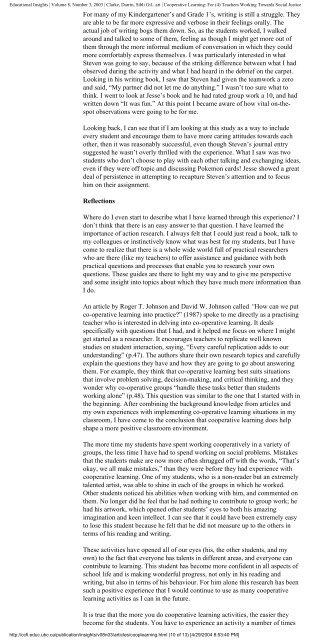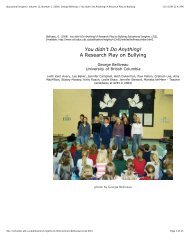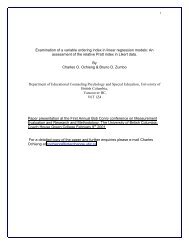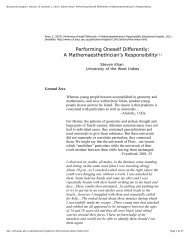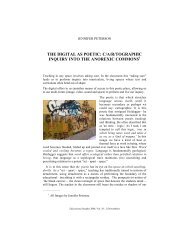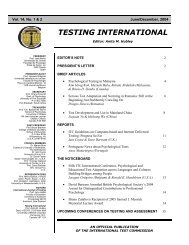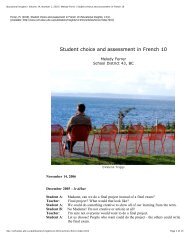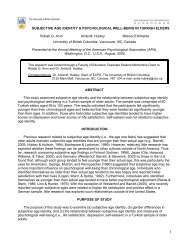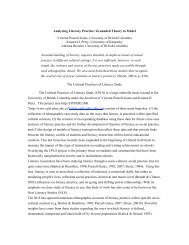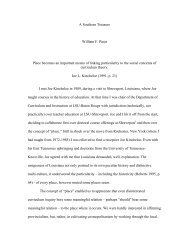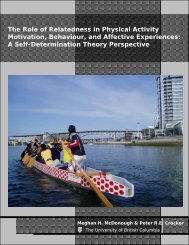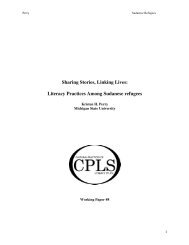Educational Insights | Volume 8, Number 3, 2003 | Clarke, Darrin ...
Educational Insights | Volume 8, Number 3, 2003 | Clarke, Darrin ...
Educational Insights | Volume 8, Number 3, 2003 | Clarke, Darrin ...
Create successful ePaper yourself
Turn your PDF publications into a flip-book with our unique Google optimized e-Paper software.
<strong>Educational</strong> <strong>Insights</strong> | <strong>Volume</strong> 8, <strong>Number</strong> 3, <strong>2003</strong> | <strong>Clarke</strong>, <strong>Darrin</strong>, Sibli Gil...art | Cooperative Learning: For (4) Teachers Working Towards Social Justice<br />
For many of my Kindergartener’s and Grade 1’s, writing is still a struggle. They<br />
are able to be far more expressive and verbose in their feelings orally. The<br />
actual job of writing bogs them down. So, as the students worked, I walked<br />
around and talked to some of them, feeling as though I might get more out of<br />
them through the more informal medium of conversation in which they could<br />
more comfortably express themselves. I was particularly interested in what<br />
Steven was going to say, because of the striking difference between what I had<br />
observed during the activity and what I had heard in the debrief on the carpet.<br />
Looking in his writing book, I saw that Steven had given the teamwork a zero<br />
and said, “My partner did not let me do anything.” I wasn’t too sure what to<br />
think. I went to look at Jesse’s book and he had rated group work a 10, and had<br />
written down “It was fun.” At this point I became aware of how vital on-thespot<br />
observations were going to be for me.<br />
Looking back, I can see that if I am looking at this study as a way to include<br />
every student and encourage them to have more caring attitudes towards each<br />
other, then it was reasonably successful, even though Steven’s journal entry<br />
suggested he wasn’t overly thrilled with the experience. What I saw was two<br />
students who don’t choose to play with each other talking and exchanging ideas,<br />
even if they were off topic and discussing Pokemon cards! Jesse showed a great<br />
deal of persistence in attempting to recapture Steven’s attention and to focus<br />
him on their assignment.<br />
Reflections<br />
Where do I even start to describe what I have learned through this experience? I<br />
don’t think that there is an easy answer to that question. I have learned the<br />
importance of action research. I always felt that I could just read a book, talk to<br />
my colleagues or instinctively know what was best for my students, but I have<br />
come to realize that there is a whole wide world full of practical researchers<br />
who are there (like my teachers) to offer assistance and guidance with both<br />
practical questions and processes that enable you to research your own<br />
questions. These guides are there to light my way and to give me perspective<br />
and some insight into topics about which they have much more information than<br />
I do.<br />
An article by Roger T. Johnson and David W. Johnson called “How can we put<br />
co-operative learning into practice?” (1987) spoke to me directly as a practising<br />
teacher who is interested in delving into co-operative learning. It deals<br />
specifically with questions that I had, and it helped me focus on where I might<br />
get started as a researcher. It encourages teachers to replicate well known<br />
studies on student interaction, saying, “Every careful replication adds to our<br />
understanding” (p.47). The authors share their own research topics and carefully<br />
explain the questions they have and how they are going to go about answering<br />
them. For example, they think that co-operative learning best suits situations<br />
that involve problem solving, decision-making, and critical thinking, and they<br />
wonder why co-operative groups “handle these tasks better than students<br />
working alone” (p.48). This question was similar to the one that I started with in<br />
the beginning. After combining the background knowledge from articles and<br />
my own experiences with implementing co-operative learning situations in my<br />
classroom, I have come to the conclusion that cooperative learning does help<br />
shape a more positive classroom environment.<br />
The more time my students have spent working cooperatively in a variety of<br />
groups, the less time I have had to spend working on social problems. Mistakes<br />
that the students make are now more often shrugged off with the words, “That’s<br />
okay, we all make mistakes,” than they were before they had experience with<br />
cooperative learning. One of my students, who is a non-reader but an extremely<br />
talented artist, was able to shine in each of the groups in which he worked.<br />
Other students noticed his abilities when working with him, and commented on<br />
them. No longer did he feel that he had nothing to contribute to group work; he<br />
had his artwork, which opened other students’ eyes to both his amazing<br />
imagination and keen intellect. I can see that it could have been extremely easy<br />
to lose this student because he felt that he did not measure up to the others in<br />
terms of his reading and writing.<br />
These activities have opened all of our eyes (his, the other students, and my<br />
own) to the fact that everyone has talents in different areas, and everyone can<br />
contribute to learning. This student has become more confident in all aspects of<br />
school life and is making wonderful progress, not only in his reading and<br />
writing, but also in terms of his behaviour. For him alone this research has been<br />
such a positive experience that I would continue to use as many cooperative<br />
learning activities as I can in the future.<br />
It is true that the more you do cooperative learning activities, the easier they<br />
become for the students. You have to experience an activity a number of times<br />
http://ccfi.educ.ubc.ca/publication/insights/v08n03/articles/cooplearning.html (10 of 13) [4/29/2004 8:53:40 PM]


